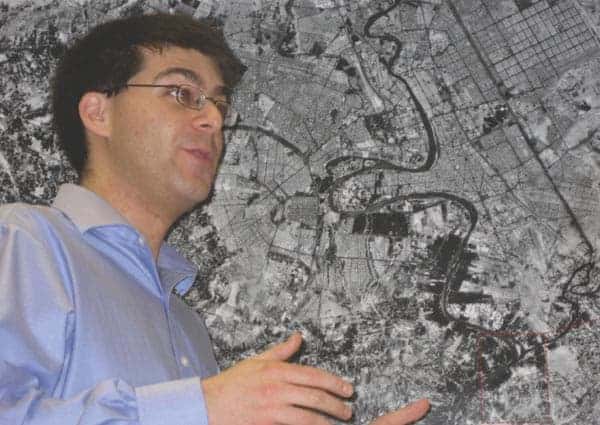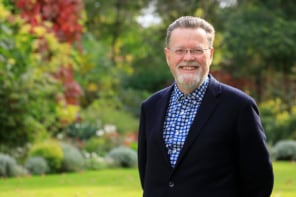A background in physics plus a keen interest in politics and current affairs can add up to a rewarding career in international security, as James Acton explains

I first began to contemplate moving from physics to the world of policy at the American Physical Society’s March Meeting in 2004. At the time I was a PhD student at Cambridge University in the UK and was at the meeting in Montreal to give a short talk on my condensed-matter research. I have always had a strong interest in international affairs, and proliferation issues in particular, so I was pleased — if slightly surprised — to see a session on “non-proliferation and counter-proliferation” at the conference. Four years later, I can recall very little of that session’s content, but I do have two abiding impressions: first, that there is a useful role for physicists to play in the policy process; and second, that it is even possible to get paid for doing it.
After my PhD, a brief spell as a physics postdoc, endless speculative applications and three miserable months of unemployment, in January 2006 I started work as a science fellow at a small London-based nongovernmental organization (NGO) called VERTIC (the Verification Research, Training and Information Centre), where I was involved in a couple of projects concerned with analysing technical measures to enhance the effectiveness of various efforts of the International Atomic Energy Agency (IAEA) in its work on preventing nuclear proliferation. In November 2006 I started a part-time postdoc at the Centre for Science and Security Studies (otherwise known as CS3), part of the Department of War Studies at King’s College London, before taking up a full-time lectureship there last year.
The core of my work involves using science to help inform policy debates on international security, particularly nuclear non-proliferation, arms control and disarmament. Most people assume I must therefore be a nuclear physicist. In fact, it is a job in which you need to be a jack of all trades; everything from mechanics (for modelling the debris cloud produced from a blown-up satellite, for instance) to solid-state physics (for understanding the effectiveness of radiation detectors, say) is relevant.
Nuclear uncertainty
One project I tackled last year was an independent analysis of how effective the IAEA is in its efforts to safeguard Iran’s nuclear programme (the IAEA keeps its own analysis of those efforts confidential). Part of the IAEA’s job is to track fissile material to make sure that none is diverted for nefarious purposes. As all measurements have an associated error, there is always some uncertainty in the IAEA’s findings. Working out that uncertainty involves scouring the Internet to find details of the measurement techniques used by the IAEA and then creating a model to combine the errors — conceptually identical (if somewhat more complicated) to what I did 10 years ago in first-year undergraduate practicals!
Just as an understanding of science is vital to my work, so is an understanding of policy. It is important to stay well versed in current affairs, to be able to identify the key policy questions and to demonstrate how and why scientific considerations are relevant to them. These are not innate skills and nor are they ones that most physicists pick up during their education. A good place to start is to read foreign-policy journals like Foreign Affairs, The Nonproliferation Review and Science and Global Security. Attending talks and discussions is also important. In my case, years spent taking part in and coaching debating while at university certainly helped.
Currently I am finishing a publication on the abolition of nuclear weapons. I have been working with a politics expert to analyse the technical and political challenges to complete nuclear disarmament and to suggest what countries can do to surmount them. Again, much of this work has been focused on verification, the process of determining whether a state is complying with an agreement, in this case, to abolish nuclear weapons. It is important to recognize that even this issue is not purely technical. While questions such as “how effective can verification be?” might be technical, questions like “how effective does verification need to be?” certainly are not.
The life span of most projects in the policy world is much shorter than in academic physics (my first contract was a terrifyingly brief three months). Moreover, a much greater emphasis is placed on disseminating the results of research. If your aim is to influence a policy debate, it is not enough just to publish your results in a journal. You also need to sit down with officials from governments and international organizations and to get them interested in what you have done. A willingness to talk to journalists is also important. The public level of knowledge about proliferation issues is generally low, so events like North Korea’s nuclear weapons test in October 2006 or the Israeli bombing of a suspected nuclear reactor in Syria in September 2007 present an opportunity to raise awareness and highlight your research to a wider audience.
Intellectual breadth
In addition to research (and the administration that is the curse of all academics), CS3 also has an active teaching programme. At its heart is an MA in Science and Security, now in its third year, which is the only one of its kind in the world. This course is characterized by its intellectual breath and attracts students from both the sciences and the social sciences (last year just over half of the students had technical degrees in disciplines such as physics, astrophysics and engineering). Moreover, a number of the students have backgrounds in, for example, the military, government or the defence industry, which makes for particularly vibrant and interesting class discussions.
In October we will be launching a new Masters course in Nonproliferation and International Security, and we have two studentships of £8500 to offer. Our students have an excellent record of going on to get jobs in the field, ranging from government positions to science journalism and the think-tank sector.
Physicists have a long history of involvement in arms control and disarmament. A number of those involved with the Manhattan Project (including J Robert Oppenheimer himself) felt a special responsibility to advise on the control of atomic energy after the Second World War and believed themselves uniquely qualified to do so. Today, even more so, technological developments help shape the international security environment; it is vital that physicists become involved in helping to understand and manage those developments.


